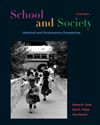While there has been a decrease in the number of students enrolled in vocational courses, as noted in Chapter 11, there is still segmentation of students into groups deemed appropriate for their perceived abilities, which are frequently determined by standardized test scores. Opponents of tracking, or ability grouping, argue that students are stigmatized by the characterization and often remain characterized for the rest of their school career, therefore being denied the opportunities available to those students felt to be more academically able. Proponents of testing argue that higher-achieving students should not be "held back" by lower-performing students, and that teachers can approach teaching more effectively with ability grouping. Below you will find two sites that present different points of view regarding the tracking of students. Additionally, it might be argued that certain teaching pedagogies and classroom management techniques tend to be reserved for certain groups of students. For example, direct instruction has provoked significant debate about not only its effectiveness for reading and the long-term consequences of its use, but the perception that its scripted style tends to be found more in low-income and minority classrooms. You will almost certainly encounter forms of tracking and other ability-based instruction as a teacher. As you consider the information and opinions offered on these sites, think about your own feelings about assessment of students and how best to accomplish this without limiting their opportunities. Clearly students bring strengths and weaknesses to the classroom–is tracking the best way to deal with them? |



 2002 McGraw-Hill Higher Education
2002 McGraw-Hill Higher Education